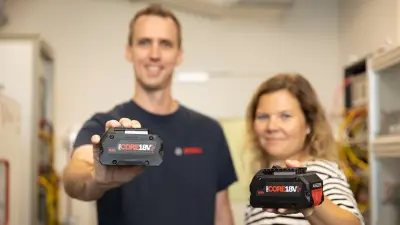Runtime boost thanks to new cell technology
What is this innovation all about?

For jobs that need real power, Bosch Power Tools has developed the new ProCORE18V+ battery, which is on the market since spring 2024. Thanks to innovative cell technology, the battery promises up to 71 percent more runtime compared to previous models – all while delivering the same power. The reason for the increase? Yvonne Schweizer, segment owner for batteries and chargers, and Andreas Gonser, battery expert, provide answers.
More runtime with the same power? The high-performance ProCORE18V+ battery makes it possible. This increase is due to a change in the design of the lithium-ion cells in the battery, known as the tabless design. Bosch Power Tools is the world’s first provider to harness this technology in 18V batteries for power tools. To give users maximum flexibility, the new generation of battery is compatible with all professional 18V system tools. In fact, it can be used with all professional tools sold since 2008 – as well as tools from the multi-brand AMPShare alliance.

What kind of applications was the new high-performance ProCORE18V+ battery developed for?
Yvonne: The ability to work cordlessly on construction sites is growing more and more important, and that’s something we want to make even easier. Our cordless tools already offer excellent performance that matches corded tools in every way. However, we know from numerous user surveys and studies that our users want even more runtime – especially for heavy-duty applications. For example, when drilling large-diameter holes in concrete with SDS Max hammer drills or using large circular saws to cut hardwood into sections. We were able to address this with the innovative battery ProCORE18V+, as it meets the needs of our target groups for more freedom from cables.
These particularly powerful batteries are based on an innovative tabless design. What does that mean, and where will the new cell technology be used in the future?
Andreas: In conventional lithium-ion batteries, each cell has a small metal strip to create an electric connection at each end ‒ at the anode and the cathode ‒ which is known as a tab. These tabs create a bottleneck for the power delivered by the battery and contribute significantly to a standard cell’s electrical resistance. That causes lots of heat to be generated, which limits runtime. To ensure that the battery doesn’t overheat, particularly during high-performance applications, the tool shuts itself off earlier, leaving the remaining energy in the battery. In tabless cells, the electricity can flow through any number of paths to the anode and the cathode rather than being restricted to one or a couple of tabs. This new design reduces the resistance of each individual cell by some 50 percent, and therefore markedly for the battery pack as a whole. Significantly less heat is generated as a result, which is otherwise a limiting factor in demanding applications.
Yvonne: In that sense, the new design is truly a major step in the advancement of lithium-ion cells. That’s why we’ll probably see even more products taking advantage of this performance boost in the future.

Which team is behind this innovation?
Yvonne: We have a global, cross-functional battery team that is working on advancing the technology and its use. Since we first started leveraging the potential of lithium-ion technology for power tools back in 2003, we have our own battery laboratory. Beyond, we work closely with the cell manufacturers.

Up to 71 percent more runtime while delivering the same power

What is it like to work with the cell manufacturers?
Andreas: The tables cells were developed in close cooperation with the cell manufacturers, following Bosch specifications. Based on in-house tests and market requirements, we draw up a specification catalogue, which we discuss with them. They then develop prototypes that we test at our battery lab under the toughest conditions for various stages of use. That lets us work together to develop cells that meet our requirements.
What are the next steps in development?
Andreas: The new battery lets us achieve significantly longer runtimes coupled with the ultra-high performance our tools already deliver. The next step we plan to work on is pushing the performance and energy density even further. Cell technology is evolving rapidly right now, especially due to the gigantic electromobility market. Today, fully cordless applications are possible that still seemed impossible a few years ago. Our new batteries allow us to reach entirely new performance dimensions for our professional users on construction sites, as well as in our garden tools and our tools for DIYers. We want to work on enhancing that even further and getting our batteries in even more tools.
Yvonne: We’re also going to continue ensuring compatibility with the entire professional 18V system in order to keep making everyday work as easy as possible for our users – and offer a wide range of power tools that can be operated with just a single, high-performance battery system.

Summary
The ProCORE18V+ innovation battery promises up to 71 percent more runtime with the same performance compared to its predecessor model. This is made possible by the so-called tabless design of the lithium-ion cells contained in the battery. Bosch Power Tools is thus setting another important milestone on the road to the cordless construction site.

Our experts
Yvonne Schweizer has been with Bosch Power Tools since 2011 and has been in her role as segment owner for batteries and chargers since 2022. She studied International Business at Reutlingen University and then started her career as a product manager. In addition to the cross-functional collaboration with colleagues worldwide, what she loves about her work is the innovative power behind the topic of batteries: "We can make a difference here that has a significant impact on Bosch Power Tools' business and inspires users."
Andreas Gonser has been working as battery expert at Bosch Power Tools since 2017. After completing his degree in materials science at the University of Stuttgart, he initially worked in central research at Bosch for three and a half years. During this time, he already focussed on the research field of lithium-ion cells, specifically silicon anodes. A fascination that continues to this day. His motivation? To provide the best battery technology on the market: "It motivates me to push technology to its limits and break new ground."



